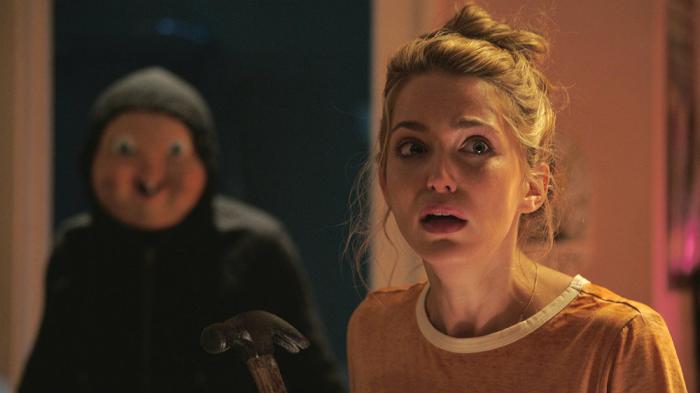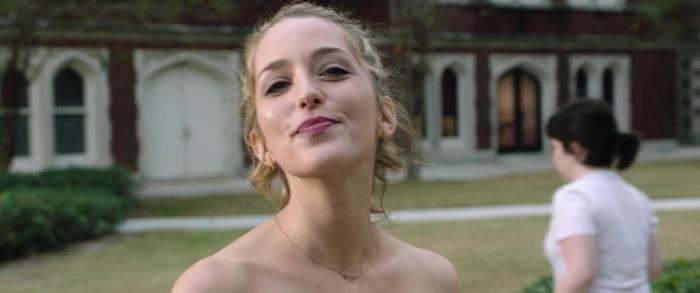By Kristy Puchko | Film | February 12, 2019

Let’s face it. We love to see a mean girl get hers. Whether it’s the Heathers being slaughtered or Regina George get flattened by a school bus, there’s a darkly delicious glee to seeing karma kick these pretty bitches right in their perfect teeth. Happy Death Day leaned into our lust for mean girl vengeance with a premise that threw selfish and shameless sorority sister Tree Gelbman (Jessica Rothe) into a merciless time loop, where she’d be murdered over and over by a mysterious killer. But there’s something fiercely refreshing about this willfully silly slasher flick. By making its Final Girl a mean girl, screenwriter Scott Lobdell refused us the problematic “perfect victim” narrative and offered instead a rich character tale with a feminist edge.
Full Disclosure: when I first reviewed Happy Death Day upon its theatrical release in 2017, I hated it. I’d seen Tree as a step back in modern Final Girls. The heroines of Scream, Cabin In The Woods and It Follows got to be good girls without living up to the virginal standards of Halloween (1978)’s Laurie Strode. But Tree Gelbman stems from another female stereotype grounded by that genre-defining slasher: the bitchy bimbo. Enjoying sex and exposing their bodies to a creeping Michael Myers (knowingly or not), Annie Brackett, Lynda Van der Klok, and Judith Myers were lusty and to be leered at. For both these sins, they were punished. A long line of sexually active teen girls would follow them in a slew of ’80s slasher flicks, many of which targeted co-eds and sororities. And we, the carnage-craving audience, were meant to relish their gruesome demises, which was made easier by dehumanizing depictions that suggested these bad girls were asking for it.
We’re meant to think Tree is asking for it. She’s pretty, popular, and cruel. She awakens from a blackout drunk in a stranger’s bed, then is rude to every person who crosses her path, from a could-be beau to her chipper roommate who offers her a birthday cupcake. And she has a shocking lack of pop culture awareness, shrugging when asked about Groundhog Day and Bill Murray. She could stand to be taken down a peg. So when a mysterious slasher wearing a baby mask pops up to slay her, we’re not rooting for Tree to live. Then, like Edge of Tomorrow or Russian Doll, her death triggers a reboot. She awakes once more in the bed of a sweet-faced stranger but is poised to die all over again. And again and again.
Embracing the absurdity of ’80s slashers deaths with the slick aesthetic of ’90s studio horror, screenwriter Scott Lobdell gave us a horror-comedy that relished in murder but stayed clear of gore. (Got to keep that PG-13 rating to hit all those teen audiences!) This kept the tone of Happy Death Day strikingly light, even jaunty. A murder montage shows an increasingly annoyed Tree being killed again and again, and we’re not meant to scream but to cackle! The first time around, this rubbed me the wrong way, in part because I felt the shift from straight-faced horror to broad comedy was jarringly abrupt. My initial perspective was shaped by trailers that painted Happy Death Day as a straight-forward slasher. Rewatching the film knowing full well it was a horror-comedy, I was better able to appreciate it for the movie it is and not the one it was sold to me as. In retrospect, I should have picked up on the tonal clue that was a ridiculous baby mask as the killer’s costume of choice.
Over the course of many deaths, Tree realizes the list of suspects is long because she’s been a jerk to just about everyone. As she investigates her own murder, she also works on becoming a better person. In 2017, I complained that Tree’s transformation from mean girl to a Final Girl worth rooting for was too little too late, which left me numb to the film’s life-or-death stakes. This time, I was more easily taken in by the comedic charms of Rothe, whose mugging is ferocious and funny. Her frustration is as entertaining as her joy, making every high and low of Tree’s journey feel like a jolt of adrenaline. But more fascinating to me was not just the unmistakable charisma of this leading lady, who even on my first review I commended for her verve, it was what Lobdell is doing by making such a bitchy bimbo a heroine.
Yes, our dislike of Tree is meant to allow us to enjoy her deaths, keeping the repeat killing device from getting too grim. However, Lobdell’s grander point is that Tree didn’t have this coming at all. The film slyly pushes its audience to consider our bloodlust for a heroine who won’t play by the rules defined by nice girls. Why should she? Being nice or friendly as a preservation tool is a fiction we feed ourselves to give us a sense of safety. As Scream called out in 1996, it’s the sin factor that draws a slasher. But real life doesn’t work that way. Women know all too well there are no Nice Girl Rules that guarantee your safety. Nowadays, the wildly popular podcast My Favorite Murder urges listeners to ditch these sexist constraints, urging instead “Fuck politeness,” and “Stay Sexy, Don’t Get Murdered.” Both of which encourage women to value their safety and identity over what society wrongly suggests will save them. Tree embodies both adages. She even dares to go for a nude stroll on campus, but in a clever turnaround on Male Gaze that is typically aimed at girls like her. Rather than allowing us the chance to ogle her body—as we have so many doomed sorority girls before—the camera focuses on the jaw-dropped reactions of the student body and Tree’s amusement at watching them. It’s a moment of empowerment not objectification.

Happy Death Day denies us the cozy “perfect victim” narrative, which suggests only good girls deserve our compassion. Tree is a bitch. Still, Lobdell argues that doesn’t mean she deserved to be murdered. Expectations of the slasher genre and the fate of the bitchy bimbo initially encourage us to root for Tree’s death and even laugh at her pain. But as she rebounds with understandable outrage and admirable pluck, we are given the opportunity to see there’s more to this mean girl than her demeaning stereotype. Happy Death Day digs into Tree’s tragic backstory and gives her a romance where she can blossom. But it’s not being nice that saves her life. By the time Tree finally secures her happy ending, she’s changed for the better. And if we’ve been watching closely, maybe we have too.
Kristy’s review of Happy Death Day 2U coming soon…